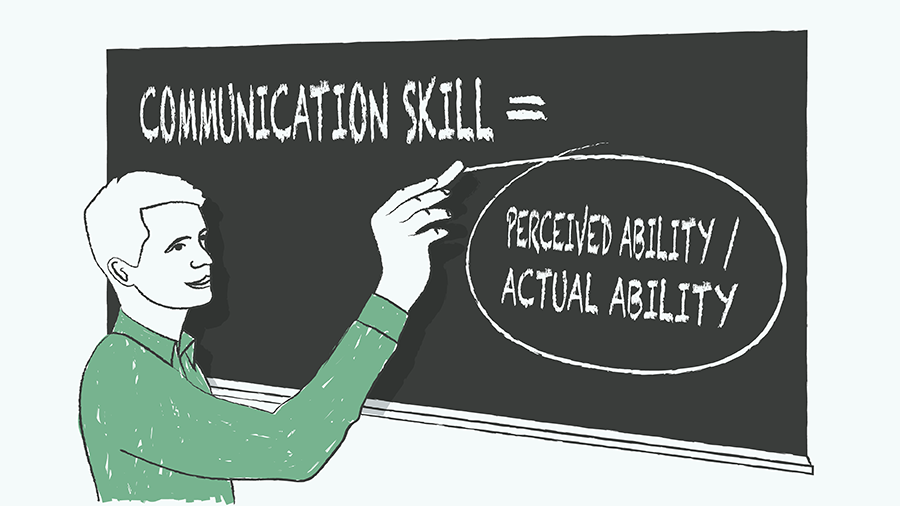
I have to put the same question to one of the UK’s experts in selection, Douglas Board. His degree was a first class honours in mathematics from Cambridge. Surely there isn’t an equation for interviewing?
“Well, I’ve invented one which can help you avoid a common mistake!” he replies. “Seriously, sweating the complex abstractions of pure mathematics did pay off in my first job in the Treasury. I didn’t do any mathematics; I was a trainee policy adviser. But the maths gave me the intellectual muscle not to melt into a damp puddle when I had to get on top of 200-page Acts of Parliament. A long Act of Parliament is like a suitcase horribly full of if … then … formulae laid out like the train tracks at Clapham Junction station.”
Douglas left the Treasury to work for 18 years in executive search. He advised on a wealth of leadership appointments across different sectors, many of which broke new ground in diversity and in another ways – such as pioneering searches for privatised utility regulators, the first search for a chief executive of the NHS and the first external search for a CFO for the John Lewis Partnership.
But it’s what he did next which opened the door to a rare level of insight into leadership: in 2010, he completed a doctorate in the selection of people for senior roles. The resulting book[1] so impressed the FT that they printed a 1,000 word extract from it.
I guess that intellectual muscle came back into its own! But can university thinking help growth companies? “That’s not a question we’d ask about science or high tech businesses, is it?” Douglas replies. “Granted, the importance of cutting-edge research is not so obvious in the humanities or social science, but let me give an example.
“A lot of growth leaders are passionately creating new forms of organisation which work better for everyone inside them, as well as for customers, shareholders and the planet. I know that’s why becoming a BCorp matters to ORESA. Now some scholars – for example Gary Hamel in his 2020 book ‘Humanocracy’ – think that politics is produced by bureaucracy; and that by ripping out hierarchy (and most of the HR function) it’s possible to create flatter, more agile organisations and get shot of the politics. My own 2021 book ‘Elites’[2] sets out why that won’t work – for the same reasons, by the way, which result in us still being surrounded by glass ceilings despite at least 30 years’ effort to strip them out.”
For the past ten years Douglas has concentrated on C-suite coaching, helping individuals think about purpose, and writing – if “Choosing Leaders” was his first book, “Elites” is his fifth, with an applied research book and two novels in between. One of these, “MBA”[3] is a side-splitting farce set in a business school. It asks why so much of the world is managed by a***holes …
I’m thrilled that Douglas has agreed, to be a source of expert advice for ORESA, and to contribute insights to future [newsletters]. But first I want that equation for interviewing!
Douglas: “We know that some people are gifted with words and can present achievements so that they shine in an interview, while others struggle. This communication skill can be captured in the equation:
Communication skill = perceived ability / actual ability
“School maths[4] tells us we can re-arrange that equation like this:
Actual ability = perceived ability / communication skill.
“Which gives us something very actionable. Imagine trying to fill a detail-focussed, make-it-happen COO role. Suppose after interview the final two candidates are level-pegging. This means they have the same ability as you perceive it. But suppose one has better communication skills. Then make sure to choose the other – because their actual achievements will be more impressive. They only looked equal because they had to pass through the communications filter of the interview.”
Order ‘Elites’ and ‘MBA’ at www.eye-books.com before [31 January]and get ‘MBA’ free: enter ‘ORESA’ at checkout.
[1] “Choosing Leaders and Choosing to Lead: Science, Politics and Intuition in Executive Search” (Gower 2012).
[2] “Elites: can you rise to the top without losing your soul?” (Eye Books 2021).
[3] Lightning Books (2015)
[4] Multiply both sides by ACTUAL ABILITY, and divide both sides by COMMUNICATION SKILL.
















